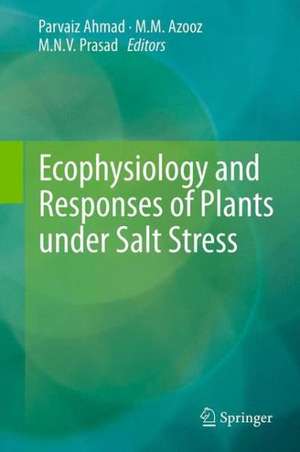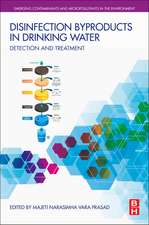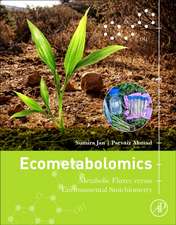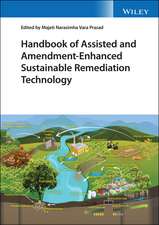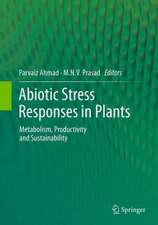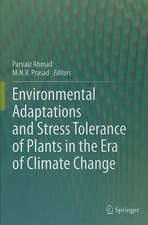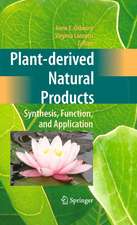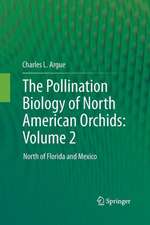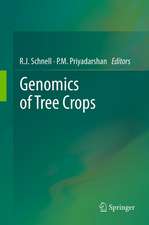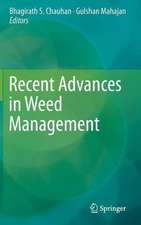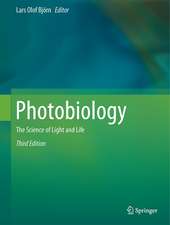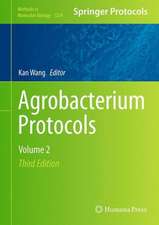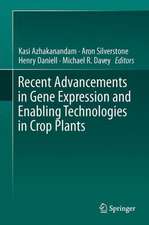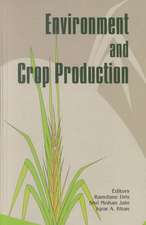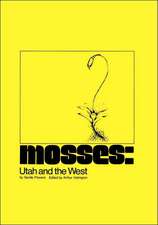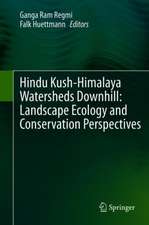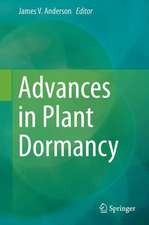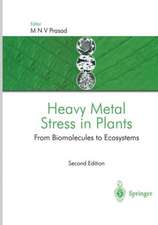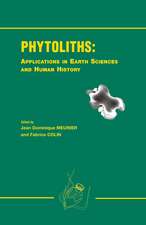Ecophysiology and Responses of Plants under Salt Stress
Editat de Parvaiz Ahmad, M.M. Azooz, M. N. V. Prasaden Limba Engleză Hardback – 8 noi 2012
| Toate formatele și edițiile | Preț | Express |
|---|---|---|
| Paperback (1) | 1391.04 lei 6-8 săpt. | |
| Springer – 12 dec 2014 | 1391.04 lei 6-8 săpt. | |
| Hardback (1) | 1395.63 lei 6-8 săpt. | |
| Springer – 8 noi 2012 | 1395.63 lei 6-8 săpt. |
Preț: 1395.63 lei
Preț vechi: 1701.99 lei
-18% Nou
Puncte Express: 2093
Preț estimativ în valută:
267.05€ • 279.83$ • 220.77£
267.05€ • 279.83$ • 220.77£
Carte tipărită la comandă
Livrare economică 11-25 aprilie
Preluare comenzi: 021 569.72.76
Specificații
ISBN-13: 9781461447467
ISBN-10: 1461447461
Pagini: 528
Ilustrații: XVI, 512 p.
Dimensiuni: 155 x 235 x 34 mm
Greutate: 0.86 kg
Ediția:2013
Editura: Springer
Colecția Springer
Locul publicării:New York, NY, United States
ISBN-10: 1461447461
Pagini: 528
Ilustrații: XVI, 512 p.
Dimensiuni: 155 x 235 x 34 mm
Greutate: 0.86 kg
Ediția:2013
Editura: Springer
Colecția Springer
Locul publicării:New York, NY, United States
Public țintă
ResearchCuprins
Preface.- Role of Ca2+ in alleviating salt stress.- An overview on the role of plant volatile organic compounds (VOCs) in salt stress.- Adaptive Plasticity of salt stressed root systems.- Salt-stressed plants and their responses to cadmium.- Soil and water management for sustained agriculture in alluvial plains and floodplains exposed to salinity: A case study of Neretva river estuary.- In vitro culture and salt stress in plants.- Role of Arbuscular mycorrhiza in inducing resistance to salinity.- The role of NO in alleviating salt stress in plants.- Plant growth regulators and biomass partitioning in crops under salinity.- Salt stress and Photosynthesis.- Role of Jasmonates in Plant Adaptation to Stress.- Salt stress and nitrogen and phosphorus metabolism in plants.- Proline and glycinebetaine: chemistry, synthesis and role in plants.- Non-enzymatic antioxidants and ROS as signaling molecules in plants under salt stress.- Role of polyamines in alleviating salt stress.- Salt stress: Causes, Types and Physiological Responses of Plants.- Role of Phytochrome in Stress Tolerance.- Sulfur: Metabolism and role in plants under salt stress.- Breeding citrus.- Index.
Notă biografică
Dr. Parvaiz Ahmad (Editor)
Dr. Parvaiz is Assistant professor in Botany at A.S. College, Srinagar, Jammu and Kashmir, India. He has completed his post-graduation in Botany in 2000 from Jamia Hamdard New Delhi India. After his Ph.D from Indian Institute of Technology (IIT) Delhi, India in 2007 he joined International Centre for Genetic Engineering and Biotechnology, New Delhi, India. His main research area is stress physiology and molecular biology. He has published more than 30 research papers in peer reviewed journals and 16 book chapters. He has also edited three volume 2 with Springer NY USA and 1 with Studium Press Pvt. India Ltd., New Delhi, India. He have received Junior Research Fellowship and Senior Research Fellowship by CSIR, New Delhi, India, during his Ph.D. Dr. Parvaiz has been awarded Young Scientist Award under Fast Track scheme in 2007, by Department of Science and Technology, Govt. of India, New Delhi, India. Dr. parvaiz is actively engaged in studying the molecular and physio-biochemical responses of different agricultural and horticultural plants under environmental stress.
Prof. Mohamed M. Azooz (Co-editor)
Pro.Dr. M.M. Azooz is a Professor of Plant Physiology in department of Botany, Faculty of Science, South Valley University, Qena, Egypt. He received the B.Sc in 1984 and M. Sc. in 1990 from Assiut University, Egypt; and Ph.D in 1997 from South Valley University, Qena, Egypt in collaboration with Tübingen University, Germany. He has published more than 70 research articles in peer reviewed journals and 5 book chapters in international books. He has supervised many M.Sc. students and Ph.D. scholars till date and many are in progress. He is a member of editorial board and reviewer of many international journals. Prof. Azooz has been included in Marquis Who’s in the World (Biography, 28th Edition, 2011), and in the “Top 100 Scientists” list, International BiographicalCentre, Cambridge-UK, 2011. Major focus of his research has been on the physiological, biochemical and molecular responses of plants against various biotic and abiotic stresses and the mechanisms of tolerance.
Prof. MNV Prasad (Co-editor)
Prof. MNV Prasad is a Professor in Department of Plant Sciences at the University of Hyderabad, India. He received the B.Sc. (1973) and M.Sc. (1975) degrees from Andhra University, India, and the Ph.D. degree (1979) in botany from the University of Lucknow, India. Prasad had published 138 articles in peer reviewed journals and 84 book chapters and conference proceedings in the broad area of environmental botany and heavy metal stress in plants. He is the author, co-author, editor, or co-editor for twelve books (John Wiley and Sons Inc. New York; CRC Press, Boca Raton; Springer-Verlag Heidelberg; Narosa Publishing House, New Delhi; Kluwer Academic Publishers, Dordrecht; Marcel Dekker, New York, Fizmatlit Publishers. Moscow, Ministry of Environment and Forests, Govt. of India). He is the receipeint of Pitamber Pant National Environment Fellowship of 2007 awarded by the Ministry of Environment and Forests, Government of India. He has served as visiting professor/guest researcher in many universities in different parts of the world viz., Australia, Belgium, Canada, Finland, Kazakhstan, Poland, Portugal and Sweden.
Dr. Parvaiz is Assistant professor in Botany at A.S. College, Srinagar, Jammu and Kashmir, India. He has completed his post-graduation in Botany in 2000 from Jamia Hamdard New Delhi India. After his Ph.D from Indian Institute of Technology (IIT) Delhi, India in 2007 he joined International Centre for Genetic Engineering and Biotechnology, New Delhi, India. His main research area is stress physiology and molecular biology. He has published more than 30 research papers in peer reviewed journals and 16 book chapters. He has also edited three volume 2 with Springer NY USA and 1 with Studium Press Pvt. India Ltd., New Delhi, India. He have received Junior Research Fellowship and Senior Research Fellowship by CSIR, New Delhi, India, during his Ph.D. Dr. Parvaiz has been awarded Young Scientist Award under Fast Track scheme in 2007, by Department of Science and Technology, Govt. of India, New Delhi, India. Dr. parvaiz is actively engaged in studying the molecular and physio-biochemical responses of different agricultural and horticultural plants under environmental stress.
Prof. Mohamed M. Azooz (Co-editor)
Pro.Dr. M.M. Azooz is a Professor of Plant Physiology in department of Botany, Faculty of Science, South Valley University, Qena, Egypt. He received the B.Sc in 1984 and M. Sc. in 1990 from Assiut University, Egypt; and Ph.D in 1997 from South Valley University, Qena, Egypt in collaboration with Tübingen University, Germany. He has published more than 70 research articles in peer reviewed journals and 5 book chapters in international books. He has supervised many M.Sc. students and Ph.D. scholars till date and many are in progress. He is a member of editorial board and reviewer of many international journals. Prof. Azooz has been included in Marquis Who’s in the World (Biography, 28th Edition, 2011), and in the “Top 100 Scientists” list, International BiographicalCentre, Cambridge-UK, 2011. Major focus of his research has been on the physiological, biochemical and molecular responses of plants against various biotic and abiotic stresses and the mechanisms of tolerance.
Prof. MNV Prasad (Co-editor)
Prof. MNV Prasad is a Professor in Department of Plant Sciences at the University of Hyderabad, India. He received the B.Sc. (1973) and M.Sc. (1975) degrees from Andhra University, India, and the Ph.D. degree (1979) in botany from the University of Lucknow, India. Prasad had published 138 articles in peer reviewed journals and 84 book chapters and conference proceedings in the broad area of environmental botany and heavy metal stress in plants. He is the author, co-author, editor, or co-editor for twelve books (John Wiley and Sons Inc. New York; CRC Press, Boca Raton; Springer-Verlag Heidelberg; Narosa Publishing House, New Delhi; Kluwer Academic Publishers, Dordrecht; Marcel Dekker, New York, Fizmatlit Publishers. Moscow, Ministry of Environment and Forests, Govt. of India). He is the receipeint of Pitamber Pant National Environment Fellowship of 2007 awarded by the Ministry of Environment and Forests, Government of India. He has served as visiting professor/guest researcher in many universities in different parts of the world viz., Australia, Belgium, Canada, Finland, Kazakhstan, Poland, Portugal and Sweden.
Textul de pe ultima copertă
Salt stress is one of the major abiotic stresses that imposes negative effect on plants and consequently on the plant productivity. The causal factors for salinity stress may be geological, climatic and hydrological in nature. Soil is an invaluable asset for plant productivity yielding a variety of products of economic use. Worldwide, huge loss of plant produce is incurred every year due to salinity. Prolonged salt stress would cause oxidative damage to plants. Resistance to environmental stress occurs when a plant withstands the imposed stress that may arise from either tolerance or a mechanism that would allow the plants to endure the situation. Although whole plant mechanisms can contribute to the avoidance of stress during the plants life cycle, tolerance can also occur at the cellular level. Plants are either dormant during the salt episode or there must be cellular adjustment. Compatible solutes and different enzymatic and non-enzymatic antioxidants that are produced by the plants during salt stress are implicated in salt tolerance. This volume provides background information about the causes and mechanisms of salt stress and tolerance in plants. Researchers, students, environmentalist, and other scientists will be benefited by this volume.
Caracteristici
This book will shed light on the effect of salt stress on plants development, proteomics, genomics, genetic engineering, and plant adaptations, among other topics Understanding the molecular basis will be helpful in developing selection strategies for improving salinity tolerance The book will cover around 25 chapters with contributors from all over the world Includes supplementary material: sn.pub/extras
